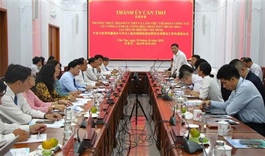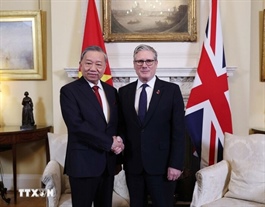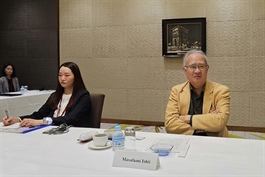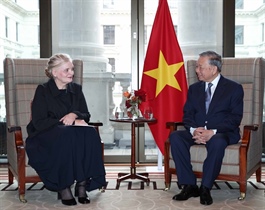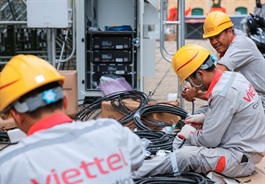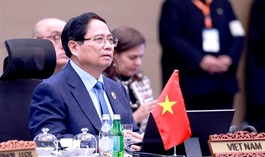Private savings creates foundation for VN’s sustainable development
Private savings creates foundation for VN’s sustainable development
Private savings is an important internal capital source, helping Việt Nam enhance resilience and create a foundation for sustainable development in the context of digital transformation and deep integration.
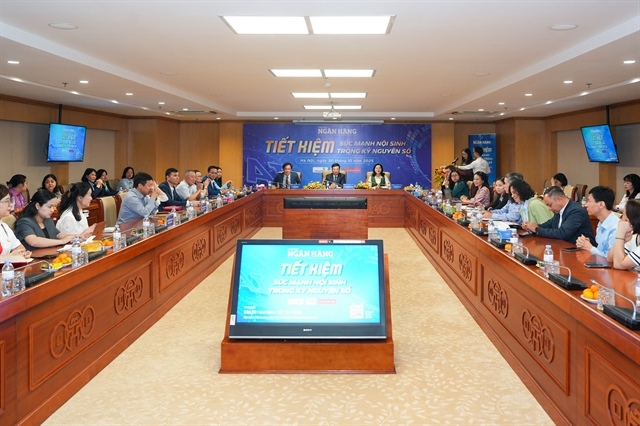
A view of the forum. VNS Photo |
Private savings are becoming a vital source of domestic capital, strengthening Việt Nam’s economic resilience and laying the foundation for sustainable development amid digital transformation and deeper global integration, officials said on Thursday.
At a forum in Hà Nội marking World Savings Day on October 31, Phạm Thanh Hà, Deputy Governor of the State Bank of Vietnam (SBV), said that alongside the country’s development, savings have increasingly proven their importance as a key economic resource, helping maintain stability and drive growth. The banking system, he noted, remains the main intermediary, mobilising and allocating capital effectively into production, business and development investment.
“Deposits at credit institutions have so far reached about VNĐ8 quadrillion, up nearly 13 per cent over the same period last year. The abundant financial resource has contributed significantly to maintaining Việt Nam's GDP growth momentum at a high level and is a bright spot in the region. It is also a clear demonstration of the effectiveness of promoting residential savings as an endogenous strength of the economy,” Hà said.
In the context of global economic volatility, shrinking international capital sources and rising capital costs, Hà emphasised that promoting domestic savings and using internal resources efficiently are now more strategic than ever. Savings, he said, are not merely a traditional value but a national development imperative — a means to strengthen financial independence, maintain macroeconomic stability and enhance resilience.
“Over the past seven decades, the banking industry has always played a vital role in the economy, a bridge to transform savings into investment and trust into prosperity. From small savings of the people, banks have created a huge capital flow into production, business, infrastructure, agriculture, education and health care, which has contributed to maintaining macroeconomic stability, controlling inflation and promoting growth,” he said.
Banks are continuing to develop modern and flexible savings products, such as online and mobile-based services, allowing people to deposit money anytime and anywhere securely and transparently.
“In the new era, when green growth, digital transformation and sustainable development trends have been spreading strongly around the world, the spirit of saving needs to be aroused more strongly, from awareness to action, from each citizen, each business to each agency and organisation,” Hà said.
Associate Professor Dr Chu Khánh Lân, Deputy Director of the SBV’s Forecasting, Statistics - Monetary and Stabilisation Department, said saving is not only important for individuals and families but also a core pillar of the national financial strategy, underpinning an independent and self-reliant economy.
Lân cited examples from countries such as South Korea, Singapore and China, which achieved rapid economic growth in just 15 to 16 years thanks to strong saving habits and low incremental capital output ratios (ICOR) of only 3.0 to 3.5.
Under Việt Nam’s National Financial Inclusion Strategy to 2025, with a vision to 2030, the Government aims for at least 25–30 per cent of adults to have deposits at credit institutions.
However, a 2024 survey by the General Statistics Office found that while 68 per cent of adults had savings in the past year, only 33 per cent deposited them in banks, with 47 per cent keeping cash at home — a challenge for mobilising idle capital into formal financial channels.
Lân said this underlines the need for stronger financial education to encourage people to participate in the formal financial system, where their savings can be used safely and productively to fuel growth.
Christian Grajek, Regional Coordinator for Asia at the German Sparkassenstiftung for International Cooperation (DSIK), told the event: “To improve the saving culture, the educational system needs to start financial education as early as possible.”
He added that financial education should be integrated into school curricula through modern methods, including gamification, and should address emerging technologies such as FinTech, financial apps and NFTs.
“The regulator should set policy targets for savings mobilisation and financial education, besides ensuring confidence in the banks and strengthening consumer protection,” he said.
- 22:00 30/10/2025




